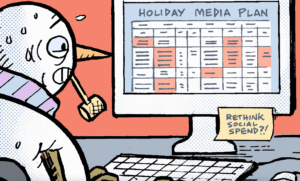Tariffs are taking effect in the US, and advertisers are shook.
According to a survey conducted by the IAB in February, 94% of advertiser decision-makers in the US are worried about the impact of tariffs on ad spending, and 45% say they plan to reduce overall ad spend in the coming months.
Their reaction isn’t surprising. They’re just trying to protect themselves against protectionism, says Brian Wieser, principal at strategic advisory firm Madison and Wall, and our guest this week on The Big Story.
“There really has not been anything like this in the modern era in any developed country,” Wieser says. “It’s always been in the other direction for trade, more open markets. This is a complete reversal.”
But here we are. And the consequence of implementing tariffs, which Wieser calls “blindingly obvious,” creates “the worst possible outcome for advertising.”
That may sound like a political statement, he says, but it’s actually an objective, “apolitical conclusion.”
Tariffs result in supply-chain disruptions, inflation and, in turn, higher prices for consumers. And if manufacturers are forced to curtail production, they don’t spend on advertising, because they can’t promote products they don’t have. We saw a similar dynamic play out during the pandemic.
Consider the impact of steel and aluminum tariffs on the automotive sector, which has deep roots across Canada and Mexico. Auto parts cross borders multiple times before they end up inside a car, “and that’s before you account for any consumer pullback on spend,” Wieser says.
In other words, the dominoes will fall.
Then, we turn to Publicis’ acquisition of data management platform Lotame, which went down last week.
Why did Publicis buy a nearly 20-year-old DMP, and how will it fit into Epsilon’s identity graph? AdExchanger Senior Editor James Hercher, who covered the deal, weighs in.















